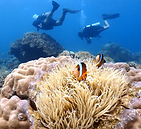
Coral predators & outbreakd
Crown of Thorns starfishes (Acanthaster planci) are some of the most famous corallivores organisms, preying on coral polyps. A single individual can be responsible for devouring 10 square meters of coral a year. In this time of conservation fight to protect coral ecosystems, such organisms often have bad reputation. But did you know that they are actually necessary to maintain reef health ? Learn more about local coral predators in this speciality class. This class is an advanced specialty class for students that already followed Coral Ecology & identification L1.
Standards
-
Learn more in depth about ecology of the Crown of Thorns starfish (Acanthaster planci), Drupella Snails (Drupella cornus, Drupella Rigosa) and Coralliophila snail (coralliophila violacea).
-
Learn about the difference between healthy populations of corallivores and outbreaks. Discuss what constitutes an outbreak, study case scenario, and what can be done to safely support reef health
-
Recognize a healthy coral from a predated one and learn to identify the local species of corallivores.
Inclusions
-
1 classroom session to teach about ecology and conservation of coral reef ecosystems
-
2 identification scuba dives with an instructor (or guided snorkeling / free diving sessions) to complement classroom session and develop identification skills of marine organisms.
-
Dive / snorkeling equipment is included along with marine fee
-
Vegetarian lunch & snacks

SCUBA DIVING
(Recommended)

SNORKELING / FREE DIVING
Choose your format
Pre-requirements
Scuba Diving format
-
An open water certification (PADI, SSI, RAID, CMAS, etc.) is required*.
-
and a minimum of 30 dives including at least 1 this year OR a buoyancy training (2 dives) with CRCP done this year*.
Snorkeling format :
-
Ability to swim comfortably (without swimming aid)
-
and Previous experience with a mask, snorkel and fins are required*.
* (You do not fit the requirements? No worries, have a look in the scuba training section, or just contact us for advices.)

Why these requirements?
During the course, you will be learning about small fragile marine organisms and be needing to come very close from them. For your safety (some may sting) and theirs, it is important that you master good buoyancy control and precision of your movements in the water before we do so. This will also make scuba diving much more efficient and enjoyable for you. If you need, we are happy to provide such training ahead of the program.
Timelines & dates
This class is usually a 1 day session from 8 am to 3 pm with classroom session in the morning followed by in water session to complement the theory.
Classes are available any day upon request + confirmed booking.
Start time can vary so double check on the specific date you are interested to book. To insure availabilities, we require you inquire and reserve your slot with a few week's notice.
Class participation fee
The standard fee for this course are listed below and includes all theory, 2 dives, marine fees and dive/snorkeling equipment. It also includes vegetarian lunch and snacks.
-
Class fee while snorkeling : 3,500 PHP
-
Class fee on a scuba diving format : 5,400PHP
Are you Filipino? You may avail an automatic 20% discount on our programs.
Feel free to inquire if you wish to include additional dive training into the course, we are happy to adapt to your personal goals.
By taking this course, you support conservation
LearnwithCRCP is the education platform of CRCP, a fully registered non-stock non-profit NGO in the Philippines, this means that aside from the raw cost of any of our training programs, all remaining balance is used to fund our marine and terrestrial conservation projects. By participating in one of our training program, you are directly supporting environmental conservation. Read more about us and the work that we do by visiting our full website linked below.